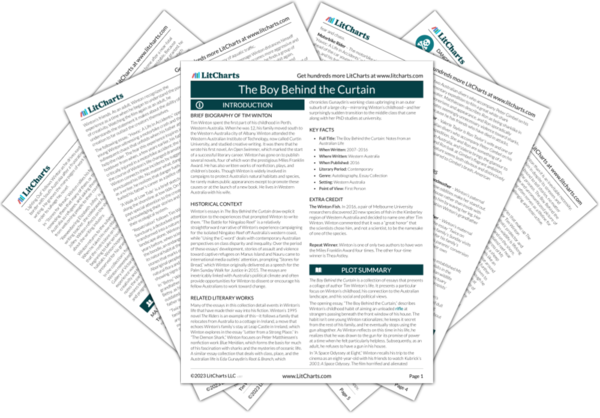In The Boy Behind the Curtain’s title essay, the unloaded rifle that young Winton points at unsuspecting passersby symbolizes the general violence that often replaces dialogue in difficult situations. Reflecting on his boyhood habit of standing in the front room of his house pointing an unloaded rifle at strangers, Winton realizes that he turned to the gun when he felt he lacked the language to express himself. He recognizes that people around him with fewer resources and less support do the same, but in their case, it’s a loaded gun, and the consequences are terrible, even fatal. Winton considers the gun as having the same power as a religious icon and as being almost as universally revered as the dollar sign. Acknowledging that the gun is an easily accessible source of danger and wary of the temptation of power it presents, Winton refuses to keep a gun in his home as an adult. When he fires a rifle around his children for the first time—harmlessly, for fun—their shock and fear remind him that the gun represents the kind of violence he wants to protect them from.
Guns Quotes in The Boy Behind the Curtain
Without words I was dangerously powerless. The gun served as a default dialect, a jerry-built lingo that may have been less sophisticated than a laundry list, but it came with ready-made scripts that had been swilling about in the back of my mind since infancy. These were storylines as familiar as the object itself. But the lexicon of the gun is narrow and inhuman. Despite its allure it was insufficient to my needs.

Unlock explanations and citation info for this and every other The Boy Behind the Curtain quote.
Plus so much more...
Get LitCharts A+Sometime during that long convalescence I came upon the helmet Dad had been wearing when he was hit. Made of laminated cork, it was cumbersome, and it felt unstable in my hands. The crazed pattern of cracks dulling its whiteness gave it an unnerving broken-eggshell texture. For a long time—for years, I think—I continued to seek it out, to turn it over in my hands, to sniff the Brylcreem interior, and try to imagine the sudden moment, the awful impact, and the faceless stranger behind all this damage.
Language, I was to discover, is nutrition, manna without which we’re bereft and forsaken, consigned like Moses and his restive entourage to wander in a sterile wilderness. As a novelist I seem to have spent every working day of my adult life in a vain search for the right word, the perfect metaphor for the story or sentence at hand, while so often writing about characters for whom words are both elusive and treacherous. I didn’t catch the bug at school, I picked it up at church.












